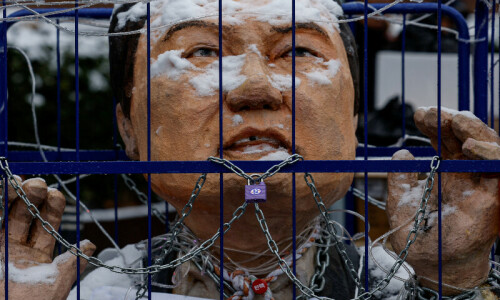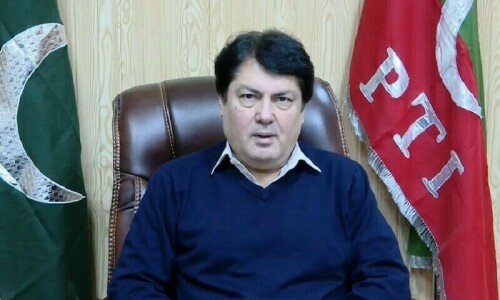Almas Perween may seem diminutive, but a great deal of responsibility rests on her shoulders. She is a farmer, and a trainer of farmers, a big responsibility for a woman from a village whose name is just a number – Chak #224/EB. Her farm is about a 100 kilometres from the historical city of Multan, in the Vehari district of Pakistan’s Punjab province. In many ways Perween epitomises this year’s International Women’s Day’s theme of “Think Equal, Build Smart, Innovate for Change”, putting innovation by women and girls, for women and girls, at the heart of efforts to achieve gender equality.
Challenging gender roles
“Why is cotton-picking always a woman’s job?” was the first thing I heard her say. The question carried within it the challenge to traditional gender roles. While Perween is happy to take on the mantle of what is traditionally seen as men’s work, her question took this further, asking why men cannot do what is traditionally done by women.
It has long been said that the soft, fluffy staple fibre of cotton that grows in a boll can only be picked by women’s dainty hands. Perween refused to accept this, claiming it was “just an excuse not to work”.
“It’s literally back-breaking work and takes a heavy health toll on the women,” she said. Drawing from her experience, she added, “village women work longer hours in a day than men”.

Her experience is borne out by research done elsewhere. A 2018 report on the status of rural women in Pakistan said agricultural work has undergone “feminization” employing nearly 7.2 million rural women, and becoming the largest employer of Pakistani women workers. Yet their multidimensional work with “lines between work for economic gain and work as extension of household chores (livestock management) and on the family farm” are blurred and “does not get captured”. The report pointed out that for women in the agricultural sector (primarily concentrated in dairy and livestock) the “returns to labour are low: only 40% are in paid employment and 60% work as unpaid workers on family farms and enterprises. Their unpaid work is valued (using comparative median wages) at PKR 683 billion (USD 5.5 billion), is 57% of all work done by women, and is 2.6% of GDP of the country.”
Cotton is one of the many crops grown on Perween’s fields. She manages 23 acres of farmland (of which eight acres belong to her mother). With her brother – three years her senior – the family grows maize, wheat, sugarcane and cotton.
Work, work, and more work
“I love being a farmer; I love getting my hands dirty and feel of the soft soil under my feet. Neither the sun or the cold bother me. I love being outdoors.” At 23, and single, which itself is unthinkable in her village, the sight of her driving the tractor through the fields is a common sight. She does her fair share, and the work is never-ending. She sprays the fertiliser and the pesticide on the crops and waters them – at any hour of the day or night. “We depend on warabandi (the rotational system for equitable distribution of available water in the irrigation system) from the canals and so once every 15 days we get water.” This means that even if the water comes in the middle, she has to handle it.

It is not just the work, or the porcupines spoiling her crop, or snakes to beware of, but also the management that makes Perween stand out from the rest. She is perhaps the only woman farmer in her area that actually goes to the mandi (the farmer’s market) – an almost exclusively male domain – to buy seeds, fertiliser, diesel, and the other goods. “Nobody can take me for a ride as I know the market rate for everything I buy or sell,” she said sharply, emphasising her confidence. “There are many women who work as hard as I do on their farms but they just fall short of being independent in the end, when they hand over the harvest and ask the men in their family to go and sell it.”
In her family, living with her parents, a married brother and two younger sisters, it is Perween who keeps control over the purse strings.
“The moment we get money from the harvest, we first buy what we will need to grow the next crop. The rest is used for home and other expenses” she said. She is the only one in the family with a bank account, and she added, her older brother who trusts her completely.
A new way to farm
Perween’s willingness to challenge norms was given a boost in 2017, when she received formal training in farming. This helped her understand how to use what she had better, particularly the precious water.
“For generations we were doing flood irrigation and I’m horrified today at the amount of water we must’ve wasted over the years.” Now she focusses on water stewardship. She defines it thus, “It is managing the water. You use it for yourself, judiciously and be mindful of the fact this resource is the property of the next generation.”

She changed the way she used water, levelled the land and learnt to use fertiliser sparingly. As her neighbours saw Perween’s crops grow, many of them started following the practices, and then farmers in neighbouring villages also adopted them. It has been almost two years since she was inducted as a field facilitator with the Rural Education and Economic Development Society, a non-profit organisation, as the only female trainer training farmers under the global Better Cotton Initiative to make cotton production “better for the people who produce it, better for the environment it grows in and better for the sector’s future”. So far, she has converted 402 farmers (both male and female) to the practices. “For example, one acre of land that would take three hours to water, now takes half the time. And when there is shortage of canal water and they turn to tubewells, they need to use less diesel to run these pumps,” explained Perween.
Along with the farming techniques, she has started pushing for fair wages. For example, she employs women farmhands during cotton picking and pays them PKR 400 (USD 2.80)/40 kgs instead of the earlier PKR 250-300 (USD 1.80-2.00) back in 2017. As she became aware of the international ban on child labour, she banned its use for her farm, and also spoke to other farmers about the potential harm of pesticides and the danger of tools for children.
Despite the success, it has not always been easy for Perween to take the risks she has. She has been lucky to have the full backing of her family. It is not just her brother’s trust, but also her father’s firm support in the face of criticism from both villagers and the wider family, that has helped her find her own path.
“It has not been easy,” she said, “but it is not impossible either,” with a note of triumph in her voice.
This article was originally published on The Third Pole and has been reproduced with permission.

















































